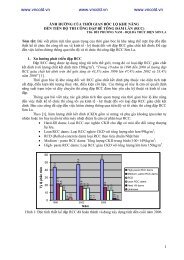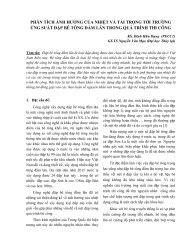Civil Engineering Project Management (4th Edition)
Create successful ePaper yourself
Turn your PDF publications into a flip-book with our unique Google optimized e-Paper software.
76 <strong>Civil</strong> <strong>Engineering</strong> <strong>Project</strong> <strong>Management</strong><br />
6.9 Offer by a tenderer to complete early<br />
A tenderer may state in his offer that his prices are dependent on being permitted<br />
to complete the works in a shorter time than the period for completion stated in<br />
the contract documents. This offer must be looked at with care because it implies<br />
that other separate contracts the employer may have let for supply of plant to<br />
be incorporated in the works must be speeded up also. Similarly any nominated<br />
sub-contractors must deliver earlier, and the engineer must be able to provide all<br />
outstanding design details according to the shorter programme. It is, of course,<br />
a benefit to an employer to have his works completed earlier: it can reduce his<br />
capital borrowing charges and enable him to gain an income from the works output<br />
earlier – though he must be able to accelerate his payments to the contractor.<br />
The question that arises, however, is whether the contractor’s shorter time period<br />
should be substituted for the period for completion stated in the contract.<br />
It is true that speedy construction can maximize a contractor’s profit or<br />
permit him to offer a lower price, but this need not be his only motive. A contractor<br />
may say he can complete a project 3 months early if he suspects the<br />
job is so liable to delay by other contractors, nominated sub-contractors, extras,<br />
incompleteness of designs or unforeseen conditions, that he runs little risk of<br />
having to abide by his promise and indeed may be able to claim extra payment<br />
for any delay caused to him.<br />
Therefore adoption of the contractor’s time as the contract period for completion<br />
needs careful consideration and the position must be resolved clearly<br />
before award of the contract. The contractor might have second thoughts<br />
about his offer because he would become liable to liquidated damages if he<br />
did not complete in the time he offered.<br />
6.10 Procedure for accepting a tender<br />
After the closing date for tenders, and if tenders have not been publicly<br />
opened, contractors will be anxious to discover where they stand: either to<br />
prepare themselves for holding discussions over their tender, or to divert their<br />
energies elsewhere if they find themselves unlikely to be offered the contract.<br />
If prices have not been arithmetically checked, it is inadvisable to give any<br />
information lest it turn out misleading. However, when the ranking of tenders<br />
has been checked, it should be possible to inform contractors enquiring if they<br />
are unlikely to succeed. Once a decision has been made by the employer, all<br />
tenderers should be informed by a standard letter, stating the prices received<br />
but not identifying the tenderers who submitted them.<br />
A valid contract must incorporate three basic elements:<br />
• an offer (e.g. the tender) and its acceptance;<br />
• consideration (i.e. the contractor undertakes to construct the works and<br />
the employer undertakes to pay him for them);


















